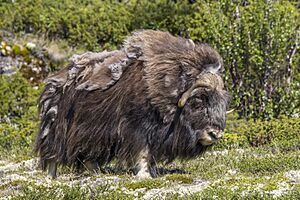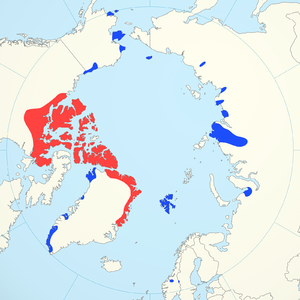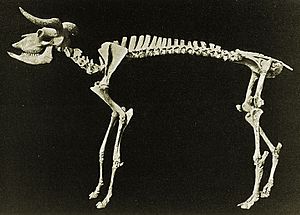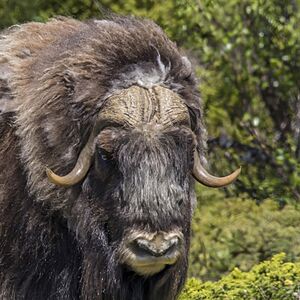Muskox facts for kids
Quick facts for kids Muskox |
|
|---|---|
 |
|
| in Dovrefjell National park, Norway | |
| Conservation status | |
| Scientific classification |
|
| Unrecognized taxon (fix): | Ovibos |
| Species: |
Template:Taxonomy/OvibosO. moschatus
|
| Binomial name | |
| Template:Taxonomy/OvibosOvibos moschatus (Zimmermann, 1780)
|
|
 |
|
| Range map: blue indicates areas where muskox reintroduction has been attempted in the 20th century; red indicates the previous established range. | |
| Script error: The function "autoWithCaption" does not exist. | |
| Synonyms | |
|
Generic:
Specific:
|
|
Script error: No such module "Check for conflicting parameters".
The muskox (Ovibos moschatus) is a large, hoofed mammal. It belongs to the Bovidae family, which includes cattle, goats, and sheep. These amazing animals live in the cold Arctic regions. They are known for their very thick fur coat. Males also release a strong scent during their mating season, which is how they got their name. This scent helps attract females. In the Inuktitut language, the muskox is called "umingmak," meaning "the bearded one."
Muskoxen once lived mainly in Greenland and the Canadian Arctic. This included the Northwest Territories and Nunavut. Long ago, they also lived in Eurasia. Today, you can find reintroduced populations in Alaska and Yukon in North America. They also live in Siberia and Norway. A small group from Norway even moved into Sweden.
Contents
About the Muskox
What is a Muskox?
The muskox is a fascinating animal. It is part of a group called hoofed mammals. Its scientific name, Ovibos moschatus, means "sheep-ox." This is because it shares traits with both sheep and oxen. However, it is actually more closely related to sheep and goats!
Where Do Muskoxen Live?
Muskoxen are perfectly adapted to the cold. They thrive in the Arctic's harsh environment. Historically, they roamed vast areas of the northern world. Today, their main homes are in Canada and Greenland. Thanks to conservation efforts, they have been brought back to other parts of their old range. This includes Alaska, Siberia, and Norway.
How Muskoxen Evolved
Muskoxen have a long and interesting history. They are the last of a special group of animals. These ancestors first appeared in warmer parts of Asia. Over time, they learned to live in the cold tundra.
Ancient Relatives
The earliest muskox ancestors had horns like sheep. They moved from Asian forests to grasslands during the Pliocene era. Later, they spread into Siberia and northern Eurasia. About two million years ago, an early muskox relative called Euceratherium crossed into North America. It used a land bridge that connected Asia and North America. This animal was larger than today's muskox. It looked like a giant sheep with huge horns.
Other ancient relatives also lived in different parts of the world. Some were found in Europe and even the Mediterranean. These early muskoxen were very adaptable. They lived in both cold tundra and temperate woodlands. Modern muskoxen are thought to have come from Siberia. They migrated to North America between 200,000 and 90,000 years ago. They survived the last Ice Age by finding places free of ice.
Modern Family Tree
The muskox belongs to a group called Caprinae. This group includes sheep and goats. So, muskoxen are more like sheep and goats than actual oxen. They are one of the largest members of this group. The only other animal of similar size is the Takin.
Scientists once thought takins and muskoxen were closely related. However, genetic studies show they are not. Their similar looks are an example of convergent evolution. This means two different animals evolve similar traits because they live in similar environments. The muskox's closest living relatives are actually the gorals. Gorals are small, goat-like animals found in Asia.
What Do Muskoxen Look Like?
Both male and female muskoxen have long, curved horns. These horns are a key feature. Muskoxen stand about 1.1 to 1.5 meters (3.6 to 4.9 feet) tall at the shoulder. Females are usually 135 to 200 centimeters (4.4 to 6.6 feet) long. Males are larger, measuring 200 to 250 centimeters (6.6 to 8.2 feet). Their tail is very short, only about 10 centimeters (4 inches) long. It is often hidden by their fur.
Adult muskoxen typically weigh around 285 kilograms (628 pounds). Their weight can range from 180 to 410 kilograms (400 to 900 pounds). Their thick coat and large head make them look bigger than they are. For comparison, a bison can weigh twice as much. However, some muskoxen in zoos have weighed up to 650 kilograms (1,430 pounds). Their fur is a mix of black, gray, and brown. It has long outer hairs that almost touch the ground. Very rarely, "white muskoxen" have been seen.
Amazing Fur: Qiviut
Muskoxen are sometimes raised for their special wool. This wool is called qiviut. It is highly valued for being incredibly soft, long, and warm. Qiviut yarn can be quite expensive. There are even muskox farms in Alaska that focus on harvesting this wool.
Muskoxen are surprisingly fast. They can run up to 60 kilometers per hour (37 miles per hour). They usually live for 12 to 20 years.
Muskox Life and Habits
What They Eat
Muskoxen are plant-eaters. In summer, they prefer wet areas like river valleys. They move to higher ground in winter to avoid deep snow. Their diet includes grasses, arctic willows, woody plants, lichens, and mosses. When there is plenty of food, they choose juicy, nutritious grasses. Willows are a favorite food in winter.
Who Are Their Predators?
The main predators of muskoxen are arctic wolves. Wolves can cause up to half of all muskox deaths. Other animals sometimes hunt muskoxen, especially calves or sick adults. These include grizzly bears, polar bears, and wolverines.
How Muskoxen Stay Warm
Muskoxen are amazing at staying warm in the cold Arctic. They are heterothermic mammals. This means they can keep some parts of their body cooler than others. For example, their lower legs stay colder. This helps them lose less body heat from their feet.
Their blood also has a special quality. The hemoglobin in muskox blood is less sensitive to temperature changes than human hemoglobin. This allows their blood to carry lots of oxygen to their cold tissues. It helps them stay active even in extreme cold.
Social Life and Reproduction

Living in Herds
Muskoxen live in groups called herds. In winter, herds usually have 12 to 24 animals. In summer, they are smaller, with 8 to 20 animals. During summer, dominant males might push other males out of the herd. Muskoxen do not claim specific territories. However, they do mark their paths with special glands near their eyes.
Both male and female muskoxen have a social order based on age. Older, mature animals are usually in charge. Dominant muskoxen get the best food. They can move younger animals away from good patches of grass in winter. Males show their dominance in several ways. They might charge at a less dominant male with their horns. They also roar, swing their heads, and paw the ground. Dominant males sometimes treat younger males like females, showing their higher rank.
Mating Season and Calves
The muskox mating season starts in late June or early July. During this time, dominant males fight to control groups of females and their young. These groups are called harems. A male will usually have six or seven females. Before fighting, males rub glands on their legs and bellow loudly. Then they show off their horns. They back up about 20 meters (66 feet) and charge at each other. They keep fighting until one male gives up. Less dominant or older males leave the herds. They form their own groups or live alone. But if there's danger, these outside males can rejoin the herd for safety.
Female muskoxen are pregnant for eight to nine months. Calves are born from April to June. Females do not give birth every year. If winters are very harsh, they might not become pregnant. When a calf is born, it stays with the herd for protection. Muskox calves are very strong from birth. They can keep up with the herd just a few hours after being born. Calves are nursed for the first two months. After that, they start eating plants and only nurse sometimes. The bond between a calf and its mother weakens after two years.
Their Special Defense Circle
Muskoxen have a very famous way to protect themselves. When a herd feels threatened, the adults form a circle or semicircle. They face outwards, with their horns ready. The calves are kept safe in the middle of this circle. The strongest males usually form the front line of defense. Females and younger animals gather close behind them. This formation is a powerful way to scare off predators.
Muskoxen and People
Are Muskoxen Dangerous?
Muskoxen are generally not aggressive animals. Attacks on humans are extremely rare. However, if people get too close or act aggressively, a muskox might charge. For example, in 1964, a man in Norway was killed by a muskox. In 2022, a court services officer in Alaska was attacked and killed by a muskox. He was trying to scare a group of muskoxen away from his home. These incidents are very unusual.
Protecting Muskoxen
In the past, too much hunting caused muskox populations to drop. But now, hunting rules help protect them. This has allowed their numbers to grow again. Today, there are an estimated 80,000 to 125,000 muskoxen worldwide. About 47,000 of them live on Banks Island in Canada.
In Greenland, muskoxen face no major threats. However, many groups are small and spread out. This makes them sensitive to changes in climate. Most populations live in national parks. Here, they are safe from hunting. Muskoxen are found in four protected areas in Greenland.
Some muskoxen are being raised by people. This is mainly for their valuable qiviut wool.
Images for kids
-
Muskox at Cape Krusenstern National Monument, Alaska
-
Muskox family in east Greenland
-
Muskox in Dovrefjell-Sunndalsfjella National Park, Norway
See also
 In Spanish: Buey almizclero para niños
In Spanish: Buey almizclero para niños
 | Percy Lavon Julian |
 | Katherine Johnson |
 | George Washington Carver |
 | Annie Easley |











